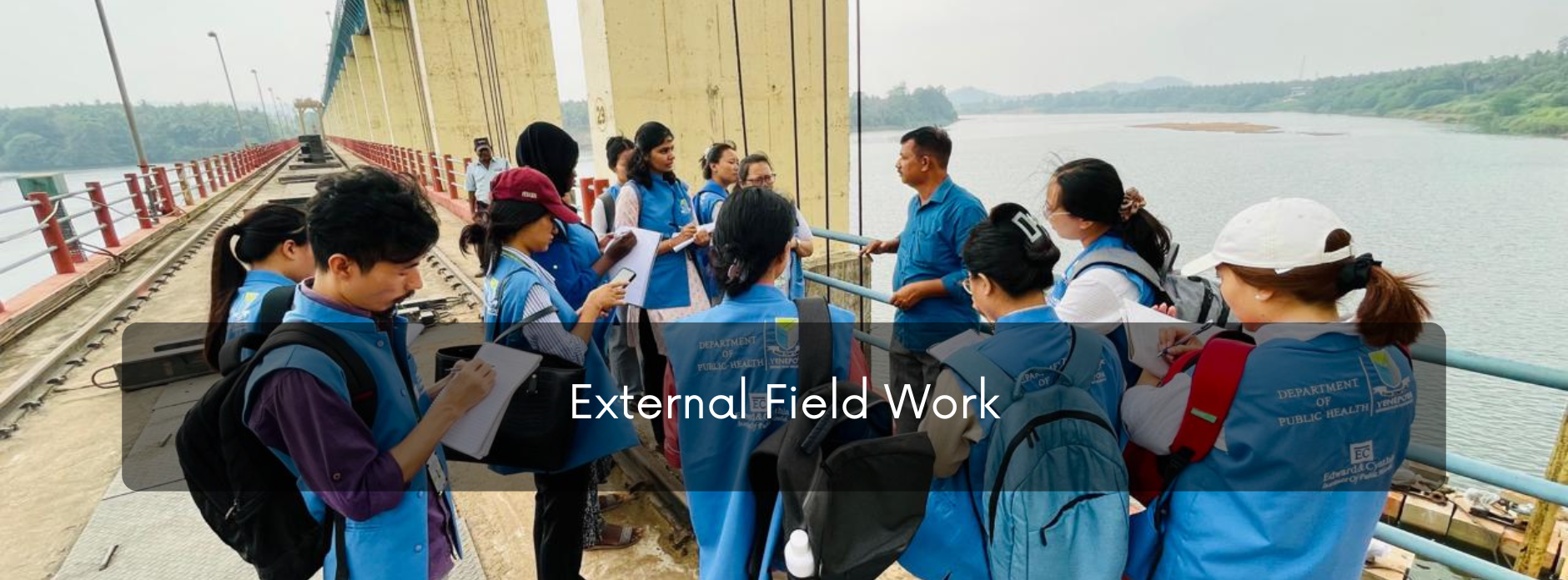Purpose and Objectives
- To provide experiential learning opportunities through on-ground engagement.
- To enhance skills in community assessment, data collection, and health intervention planning.
- To foster partnerships with government and non-governmental health agencies.
- To expose students to diverse public health settings, including rural and urban areas.
Field Work Components
- Primary Health Centers (PHCs) and Community Health Centers (CHCs): Exposure to grassroots-level healthcare delivery and management.
- District Health Offices: Understanding of health policy implementation, monitoring, and evaluation.
- Public Health Surveillance Units: Practical training in disease surveillance, outbreak investigation, and reporting.
- NGOs & INGOs: Field visits to partner organizations working on maternal and child health, nutrition, environmental health, and other pressing public health issues.
- International Exposure (Optional): For eligible students, ECIPH facilitates short-term placements or collaborative projects with international public health bodies.
Learning Outcomes
- Ability to apply theoretical knowledge to practical challenges in community settings.
- Improved competencies in epidemiological assessments, health promotion, and program evaluation.
- Development of critical thinking and problem-solving skills in diverse public health contexts.
- Preparation for careers in health systems management, research, policy, and implementation.
Supervision and Evaluation
Field work is carried out under the supervision of ECIPH faculty and designated field mentors. Regular feedback sessions, reflective journaling, and report submissions are part of the evaluation process.

Purpose and Objectives
- To provide experiential learning opportunities through on-ground engagement.
- To enhance skills in community assessment, data collection, and health intervention planning.
- To foster partnerships with government and non-governmental health agencies.
- To expose students to diverse public health settings, including rural and urban areas.
Field Work Components
- Primary Health Centers (PHCs) and Community Health Centers (CHCs): Exposure to grassroots-level healthcare delivery and management.
- District Health Offices: Understanding of health policy implementation, monitoring, and evaluation.
- Public Health Surveillance Units: Practical training in disease surveillance, outbreak investigation, and reporting.
- NGOs & INGOs: Field visits to partner organizations working on maternal and child health, nutrition, environmental health, and other pressing public health issues.
- International Exposure (Optional): For eligible students, ECIPH facilitates short-term placements or collaborative projects with international public health bodies.
Learning Outcomes
- Ability to apply theoretical knowledge to practical challenges in community settings.
- Improved competencies in epidemiological assessments, health promotion, and program evaluation.
- Development of critical thinking and problem-solving skills in diverse public health contexts.
- Preparation for careers in health systems management, research, policy, and implementation.
Supervision and Evaluation
Field work is carried out under the supervision of ECIPH faculty and designated field mentors. Regular feedback sessions, reflective journaling, and report submissions are part of the evaluation process.
